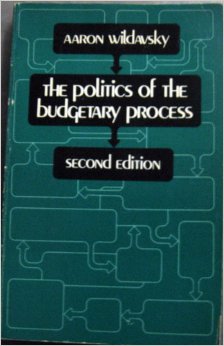Wildavsky, Aaron. Politics of the Budgetary Process. Boston: Little, Brown & Company, 1964.
“In this very readable book A. Wildavsky challenges traditional normative approaches to a theory of budgeting and proposes a political basis for understanding the budget process. Normative theory, because of its implicit imposition of a value system, is found to provide an inadequate basis for decided what should be allocated to activity A instead of activity B. The author asserts that the budget process which determines who gets what form the Government is not economic but political. Preferences are articulated through he political system (under agreed-upon rules) into units called votes or into types of authority like a veto power. Less formally they are registered by influencing various centers of power in the Congress and the executive branch. The political system even provides a means by which a spokesman can be created for those groups which have little impact through formal or informal mechanisms. He cites as an example the role of the Department of Labor as guardian of the interests of migrant laborers. Several proposals for major reforms in the budget process have not won acceptance because of their failure to recognize the necessity of altering the political system of which the budget process is but an expression.”
– From a book review in: Administrative Science Quarterly, Vol. 10, No. 1. Jun., 1965.
Online:
Amazon

